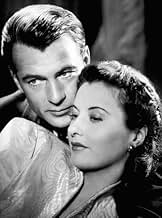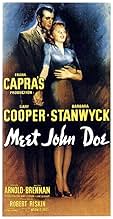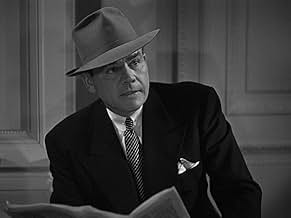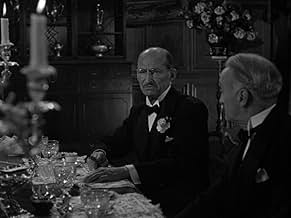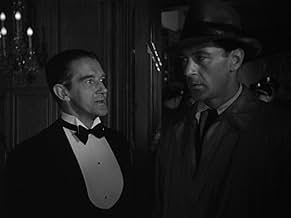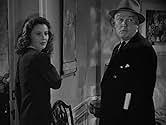CALIFICACIÓN DE IMDb
7.6/10
16 k
TU CALIFICACIÓN
Un vagabundo sin un centavo es reclutado por un columnista ambicioso para hacerse pasar por una persona inexistente que dijo que se suicidaría como protesta, y comienza un movimiento polític... Leer todoUn vagabundo sin un centavo es reclutado por un columnista ambicioso para hacerse pasar por una persona inexistente que dijo que se suicidaría como protesta, y comienza un movimiento político.Un vagabundo sin un centavo es reclutado por un columnista ambicioso para hacerse pasar por una persona inexistente que dijo que se suicidaría como protesta, y comienza un movimiento político.
- Dirección
- Guionistas
- Elenco
- Nominado a 1 premio Óscar
- 4 premios ganados y 1 nominación en total
Charles C. Wilson
- Charlie Dawson
- (as Charles Wilson)
Opiniones destacadas
10B&W-2
This film offers a standing rebuke to critics who use the term "Capracorn". None of Capra's films are as blindly optimistic as is often argued, but this one is a pitch-black jeremiad against manipulation by the media. The mob scene at the "John Doe" convention is one of the powerful scenes ever filmed. Stanwyck is incredible as reporter Anne Mitchell. She is one of the great actresses of the century, and she always did her best work Capra, whose female characters are generally more compelling to the women we get in the movies of our "liberated" era. Cooper is fantastic as a truly "average" guy who is "awakened" by his experience with the John Doe movement, and Edward Arnold is absolutely terrifying in the role of Fascist D.B. Norton. This film is even more relevant today than when it was made, and I would argue that it should be viewed in high schools across the continent. Capra is asking his viewers to think critically of EVERYTHING they hear on the radio or see in papers or hear from elites, and amen to that!
10hienai
This film is a classic example of a movie working effortlessly on a range of different layers. Capra weaves his well-loved everyman through a tale of both simplicity and political intrigue, taking in the American depression and Biblical references along the way, and comes up with messages that remain startlingly relevant today, over six decades after this movie's release.
Gary Cooper delivers a masterful performance, and in keeping with the film, achieves this with a deceptively easy touch. He is supported by a peerless cast which includes Barbara Stanwyck and Walter Brennan, both on top form.
Perhaps most impressive is the illustration of Capra's democratic ideal by including the views of the audience throughout the story. You can find all your views being voiced by different characters at various points in the tale, opening the question of just who is the average everyman that Capra is seeking to show? - and how do they relate to you?
This movie is ten stars all over. Even for keen Capra fans, the expectation is surpassed by the final delivery. Thoroughly recommended.
Gary Cooper delivers a masterful performance, and in keeping with the film, achieves this with a deceptively easy touch. He is supported by a peerless cast which includes Barbara Stanwyck and Walter Brennan, both on top form.
Perhaps most impressive is the illustration of Capra's democratic ideal by including the views of the audience throughout the story. You can find all your views being voiced by different characters at various points in the tale, opening the question of just who is the average everyman that Capra is seeking to show? - and how do they relate to you?
This movie is ten stars all over. Even for keen Capra fans, the expectation is surpassed by the final delivery. Thoroughly recommended.
After doing Mr Deeds Goes To Town and Mr Smith Goes To Washington for Columbia, Capra quit and made this third film about an average Joe thrust into a powerful world where exploitation is high on the agenda, but in true Capra style the story unfolds to a customary flip flop triumph.
Ann Mitchell is a struggling journalist who gets fired from her newspaper job by new editor Henry Connell, by way of venting her frustrations she writes in her stinging last article about a man called John Doe who is tired of being pushed around and held back by the big bosses, she finishes the piece by claiming that Doe will commit suicide on Christmas Eve by leaping off the roof of city hall, the public react to the letter with tremendous heart and Doe becomes a champion of the people.
After Connell gets interested in the letter Ann has to confess that she made it up, they hatch a plan to turn a real unemployed drop out into John Doe so as to continue the story and sell more papers, and of course Ann gets to keep her job. This brings in ex minor league pitcher Long John Willoughby, who is down on his luck and very short of cash, and this is when the story shifts from amiable comedy on to a much darker path, the result making for a riveting watch.
Whilst not being up with the best Capra films in his armoury, it is, however, one of his smartest. The portrayal of the human spirit in many guises is stark and poignant, whilst thematically Capra got his point over about the unsavoury elements blossoming in America. The cast are nailed on watchable, Gary Cooper is John Doe, the right amount of sympathy and guts is garnered from his performance, and in one rousing speech he has the viewers in the palm of his hand. Barbara Stanwyck is Ann Mitchell and she delivers a great turn that calls for a number of emotions to be performed convincingly, while the support cast are all solid with the stand out a bizarrely unnerving Edward Arnold as D B. Norton; a man wishing to be a dictator if ever there was one. 10/10
Ann Mitchell is a struggling journalist who gets fired from her newspaper job by new editor Henry Connell, by way of venting her frustrations she writes in her stinging last article about a man called John Doe who is tired of being pushed around and held back by the big bosses, she finishes the piece by claiming that Doe will commit suicide on Christmas Eve by leaping off the roof of city hall, the public react to the letter with tremendous heart and Doe becomes a champion of the people.
After Connell gets interested in the letter Ann has to confess that she made it up, they hatch a plan to turn a real unemployed drop out into John Doe so as to continue the story and sell more papers, and of course Ann gets to keep her job. This brings in ex minor league pitcher Long John Willoughby, who is down on his luck and very short of cash, and this is when the story shifts from amiable comedy on to a much darker path, the result making for a riveting watch.
Whilst not being up with the best Capra films in his armoury, it is, however, one of his smartest. The portrayal of the human spirit in many guises is stark and poignant, whilst thematically Capra got his point over about the unsavoury elements blossoming in America. The cast are nailed on watchable, Gary Cooper is John Doe, the right amount of sympathy and guts is garnered from his performance, and in one rousing speech he has the viewers in the palm of his hand. Barbara Stanwyck is Ann Mitchell and she delivers a great turn that calls for a number of emotions to be performed convincingly, while the support cast are all solid with the stand out a bizarrely unnerving Edward Arnold as D B. Norton; a man wishing to be a dictator if ever there was one. 10/10
Surprisingly topical considerig the age of the film. But then, the problems caused by the manipulation of public opinion have never been more pressing than today, in the age of social media and populist government. Unfortunately the film is let down by its sentimental ending.
Director Frank Capra lays it on pretty thick here, with a message combining the love of one's fellow man, the need to defend America's freedoms, and the power of common people to stand up to the rich and powerful when they band together and act out of decency and truth. This is a film filled with big idealistic speeches and moments meant to stir the heart. Capra knew that the democracy faced threats all over the globe as WWII loomed, but also that America, like any other country, faced threats within, that it was possible that an authoritarian may rise to power here by exploiting the masses, and controlling the media. This was a real possibility in the 1940's, and of course, is still relevant today.
It's very telling that at the beginning of the movie, a newspaper is being taken over by a rich industrialist, who wants to stimulate circulation at any cost. The plaque outside the building reading "A free press means free people" is chiseled away, and replaced with one reading "A streamlined newspaper for a streamlined age." When a plucky young reporter (Barbara Stanwyck) keeps her job only by writing a fake letter from a John Doe, we're at first led to believe that the deception is for the better, because she uses the resulting column to push altruistic messages extracted from her late father's old writing. She and the newspaper editor (James Gleason) hire a local vagrant (Gary Cooper) to play the part of John Doe, and the message expands and catches on, so much so that 'John Doe Clubs' are being formed all over the country.
The message they push is one against all sorts of ills: the collapse of decency, corruption in local politics, graft in state relief, and hospitals shutting their doors to the needy. The idea is that if people could live up to Christian ideals all year round, rather than just at Christmas-time, that if they could simply 'love thy neighbor' and exercise tolerance for one another, they would not only feel better about life, but it would solve some of society's problems. All seems well, but lurking is the rich industrialist (Edward Arnold) funding the whole thing, initially for what seems to be the common good, but sure enough, he has ulterior motives. Thus, love your fellow man, but beware those seeking to control you. And for all his optimism and faith in man, Capra knew that a mob whipped into a frenzy was dangerous, and there are some dark elements in the film.
Edward Arnold is brilliant as the industrialist, and Gleason is excellent as the editor. The two of them turn in great performances in their supporting roles, with Gleason's speech while drunk ("Yep, I'm a sucker for this country...") is one of the film's strongest. He extols the idea that the freedoms enjoyed in America to speak and live freely were important, and far preferable to the totalitarian governments at both ends of the political spectrum in the world (e.g. Fascist Germany and the Communist Soviet Union). If that sounds like a nationalistic message it is, but it was appropriate for the period, and more than balanced out by the socialist and anti-materialistic messages.
Barbara Stanwyck is a delight to watch as always, and 1941 was a fantastic here for her ('Ball of Fire', also with Cooper, and 'The Lady Eve' came out that year). She's a wee melodramatic in the film's final scene though. Gary Cooper is just average in playing the bumbling everyman, and not as strong as Jimmy Stewart in similar roles for Capra. He is awkward and wide-eyed too often, especially early in the film. On the other hand, he shows a little bit of a devilish side in his subconscious, describing a dream of spanking Stanwyck at length (a scene which is a little odd). His best exchange with Stanwyck occurs when he senses she's also corrupt, and asks her "Did you write this?", referring to his next speech, she confesses yes but "I had no idea what was going on", and he pushes past her, remarking "That's a swell bracelet you're wearing," noticing the expensive gift she's received. He then proceeds to stand up to a group of powerful men, speaking for the little guy ("I'm just a mug and I know it. But I'm beginning to understand a lot of things. Why your types are as old as history. If you can't lay your dirty fingers on a decent idea, and twist it and squeeze it and stuff it into your own pocket, you slap it down! Like dogs! If you can't eat something you bury it!")
If it's not already apparent, if you're cynical by nature, this is probably not the film for you. And, I have to say, Capra uses just a teensy bit too much of a heavy hand here, among other things likening John Doe to Jesus Christ (you know, that other great socialist who preached love and tolerance). However, he also has brilliant moments when he lets everything linger, such as when the crowd is disillusioned and wonders who is telling them the truth. That moment is simply spellbinding. Solid film, with wonderful messages.
It's very telling that at the beginning of the movie, a newspaper is being taken over by a rich industrialist, who wants to stimulate circulation at any cost. The plaque outside the building reading "A free press means free people" is chiseled away, and replaced with one reading "A streamlined newspaper for a streamlined age." When a plucky young reporter (Barbara Stanwyck) keeps her job only by writing a fake letter from a John Doe, we're at first led to believe that the deception is for the better, because she uses the resulting column to push altruistic messages extracted from her late father's old writing. She and the newspaper editor (James Gleason) hire a local vagrant (Gary Cooper) to play the part of John Doe, and the message expands and catches on, so much so that 'John Doe Clubs' are being formed all over the country.
The message they push is one against all sorts of ills: the collapse of decency, corruption in local politics, graft in state relief, and hospitals shutting their doors to the needy. The idea is that if people could live up to Christian ideals all year round, rather than just at Christmas-time, that if they could simply 'love thy neighbor' and exercise tolerance for one another, they would not only feel better about life, but it would solve some of society's problems. All seems well, but lurking is the rich industrialist (Edward Arnold) funding the whole thing, initially for what seems to be the common good, but sure enough, he has ulterior motives. Thus, love your fellow man, but beware those seeking to control you. And for all his optimism and faith in man, Capra knew that a mob whipped into a frenzy was dangerous, and there are some dark elements in the film.
Edward Arnold is brilliant as the industrialist, and Gleason is excellent as the editor. The two of them turn in great performances in their supporting roles, with Gleason's speech while drunk ("Yep, I'm a sucker for this country...") is one of the film's strongest. He extols the idea that the freedoms enjoyed in America to speak and live freely were important, and far preferable to the totalitarian governments at both ends of the political spectrum in the world (e.g. Fascist Germany and the Communist Soviet Union). If that sounds like a nationalistic message it is, but it was appropriate for the period, and more than balanced out by the socialist and anti-materialistic messages.
Barbara Stanwyck is a delight to watch as always, and 1941 was a fantastic here for her ('Ball of Fire', also with Cooper, and 'The Lady Eve' came out that year). She's a wee melodramatic in the film's final scene though. Gary Cooper is just average in playing the bumbling everyman, and not as strong as Jimmy Stewart in similar roles for Capra. He is awkward and wide-eyed too often, especially early in the film. On the other hand, he shows a little bit of a devilish side in his subconscious, describing a dream of spanking Stanwyck at length (a scene which is a little odd). His best exchange with Stanwyck occurs when he senses she's also corrupt, and asks her "Did you write this?", referring to his next speech, she confesses yes but "I had no idea what was going on", and he pushes past her, remarking "That's a swell bracelet you're wearing," noticing the expensive gift she's received. He then proceeds to stand up to a group of powerful men, speaking for the little guy ("I'm just a mug and I know it. But I'm beginning to understand a lot of things. Why your types are as old as history. If you can't lay your dirty fingers on a decent idea, and twist it and squeeze it and stuff it into your own pocket, you slap it down! Like dogs! If you can't eat something you bury it!")
If it's not already apparent, if you're cynical by nature, this is probably not the film for you. And, I have to say, Capra uses just a teensy bit too much of a heavy hand here, among other things likening John Doe to Jesus Christ (you know, that other great socialist who preached love and tolerance). However, he also has brilliant moments when he lets everything linger, such as when the crowd is disillusioned and wonders who is telling them the truth. That moment is simply spellbinding. Solid film, with wonderful messages.
¿Sabías que…?
- TriviaDirector Frank Capra didn't want anyone to play John Doe except Gary Cooper, who agreed to the part without reading a script for two reasons: he had enjoyed working with Capra on El secreto de vivir (1936), and he wanted to work with Barbara Stanwyck.
- ErroresAfter "John Doe" intrudes on D. B. Norton's dinner party and tells him off, Norton calls his newspaper and orders a special edition which will reveal Doe as a fraud. Doe takes a cab from Norton's house directly to the convention hall. Within minutes of his arrival there, a horde of newsboys appear with copies of the newspaper. It would be impossible to print an extra edition in such a short period of time. Correction: There isn't a plot hole, because D.B. Norton isn't saying nor implying that the newspaper will be printed from them on. He stated, before Ann is running after John Doe's in the Rain, "that he was prepared for this" and this does imply that the papers were already prepared, printed before. D.B. was a very rich man, callous, evil man. He foresaw all the problems in his investments.
- Versiones alternativasAlso available in a computer-colorized version.
- ConexionesFeatured in The 54th Annual Academy Awards (1982)
- Bandas sonorasTHE BATTLE HYMN OF THE REPUBLIC
(1861) (uncredited)
Music by William Steffe
Lyrics by Julia Ward Howe
Performed by Hall Johnson Choir
Selecciones populares
Inicia sesión para calificar y agrega a la lista de videos para obtener recomendaciones personalizadas
- How long is Meet John Doe?Con tecnología de Alexa
Detalles
- Fecha de lanzamiento
- País de origen
- Idioma
- También se conoce como
- Meet John Doe
- Locaciones de filmación
- Productora
- Ver más créditos de la compañía en IMDbPro
- Tiempo de ejecución2 horas 15 minutos
- Color
- Relación de aspecto
- 1.37 : 1
Contribuir a esta página
Sugiere una edición o agrega el contenido que falta

Principales brechas de datos
By what name was El mandamiento supremo (1941) officially released in India in English?
Responda

